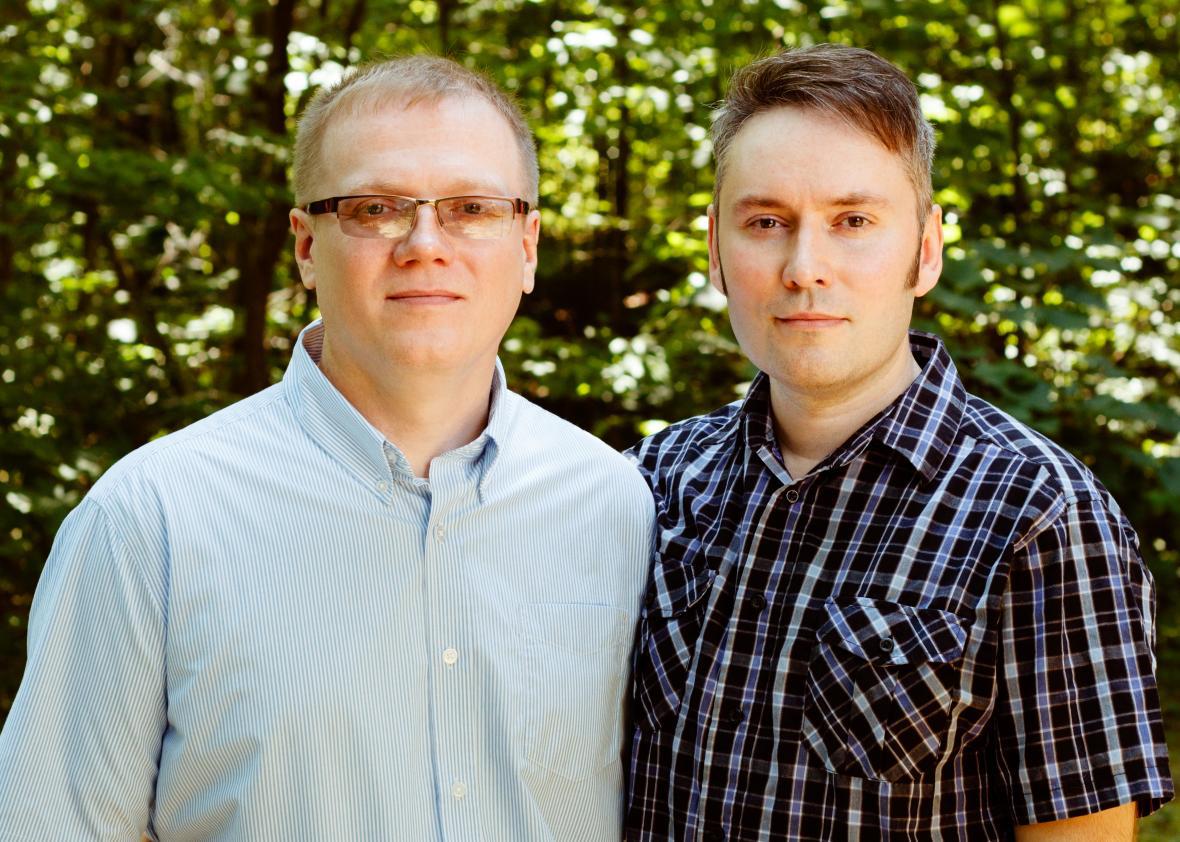David Moore and David Ermold didn’t plan to cause a national controversy when they asked for a marriage license at Kentucky’s Rowan County courthouse in July. But after posting footage of county clerk Kim Davis refusing to grant them a marriage license on account of their orientation, the couple became heroes of the gay rights movement—and targets of the anti-gay “religious liberty” crowd. Davis has since lost a lawsuit brought by the ACLU on behalf of other gay couples against whom she discriminated. But she is continuing to fight for a right to refuse service to gay Kentuckians. I spoke with Moore and Ermold on Tuesday about their experience at the courthouse, their legal battle, and where they’ll go from here.
Why did you wait for the Supreme Court to declare marriage a fundamental right before obtaining a license?
Moore: We talked about getting married for quite a long time. We’d been together for so long, we already assumed in our own mind that we are married. This is about securing our right. We work at two different universities. We want to start considering our health plan, our future—the personal rights that we’ve now been granted.
Did you consider the possibility that Davis might refuse to serve you?
Ermold: We knew going in that Davis had denied other couples. I didn’t know that anyone had actually talked to her face-to-face. I thought, if we could talk to her and she could see us, explain how long we’ve been together—that we’re people too, just like her—it might change her mind. She did get emotional when we talked, but nothing has changed.
You went to the courthouse to obtain a marriage license twice, and you filmed both encounters. Why did you put it on video?
Ermold: We wanted to document it. The only way you have any power as a citizen is to document your experience. If you go in and nobody sees it, people can say, that didn’t happen the way you said it happened. We didn’t go in and make a scene. We went in and did a mundane thing that people do every day. The way we were treated, that’s up to the [courthouse employees]. They chose to act that way.
Moore: David didn’t put that video up on YouTube right away. We talked about it, thought about it. When we put that up there, we didn’t anticipate it was going to get as much of a response as it did.
We didn’t doctor it or edit the video. That’s just the way it happened. It is hard to watch. I haven’t watched the second video. I can’t watch it. It’s too upsetting.
Ermold: Watching the video, you relive it all over again. It was worse than I thought it was.
Moore: This is what we have to remember for this moment in our lives. It’s disappointing. But we’ll get through it.
What was your immediate reaction to Davis’ refusal to serve you?
Moore: As it was happening, I kind of was emotionally shut off. People came in—they were harassing us, recording us, they called the cops on us. My goal was to talk to Kim Davis. I was emotionally out of it. I didn’t feel it until we were leaving.
Then, all of a sudden, I felt everything. I felt I was being degraded, being humiliated, treated like a second-class citizen. When you’re gay and you grow up in Kentucky, you kind of get used to hiding who you are, accommodating other people and making them feel comfortable. You don’t realize how much of your own dignity you’ve given away. It catches up to you.
What will you do if this lawsuit gets caught up in an interminable appeals process?
Moore: I don’t want it to drag on for years and years. We want to get married in Rowan County. This is where we live and pay taxes. But if the court isn’t going to come through for us— We have to be realistic and think about those things.
Ermold: This is our home county. We’d be sacrificing our dignity to go anywhere else.
